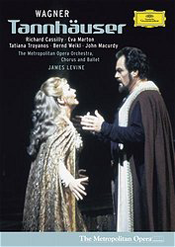At the time this production was staged, reviews called attention to the quality of this particular effort on the part of the Metropolitan Opera and the leadership of James Levine. Based on performances given on 22 November and 20
December 1982 for a broadcast of “Live from the Met,” this 2006 DVD release demonstrates the
lasting power of this production of the Paris version of Wagner’s opera.
A tradition staging, akin to the Met’s famous broadcast and, later, DVD release of Wagner’s
Ring der Nibelungen, this production is faithful to the conventional treatment of the text as a
fully medieval tale, albeit, the medievalism that Wagner brought to the public. Eschewing
avant-garde theatrics and abstract imagery, the qualities of this production reside in the
faithfulness to the traditional settings associated with the opera, including the colors and shading
that bring the work to life on stage and in the imagination of the audience. The famous opening
scene in Venusberg benefits from the choreography that points to the sensuality the composer
intended, without necessarily indulging in excessive display. With the orchestral playing
underscoring the scene, it serves as a fitting introduction to the opening exchange between
Tannhäuser, as portrayed by the American tenor Richard Cassilly, and Venus, sung here by the
late Tatiana Troyanos. The reviews of the time praised Cassily for his fine sense of drama, and
this video preserves his nuanced performance, as well as Troyanos’s elegant and compelling
depiction of Venus. The two performers clearly worked well together, both vocally and
dramatically, with body language that reinforces the meaning of the text of the emotion of the
music in this Otto Schenk production.
After immersing the audience and performers in the seductive world of Venusberg in the opening
of the first act, the transformation to a stark countryside demonstrates the gulf between those
world. The chorale-lilke hymn of pilgrims awakens Tannhäuser in the real work, with the choral
textures flawlessly underscoring the scene. As traditional as this staging is, the flawless execution
demonstrates how effective such a setting can be.
The staging gives way in the second act to the German court, the staging recreates in tableau the
kinds of images found in illustrations from the period, and it is this sense of an authentic setting
that conveys the artistic space for the performers to make the work come alive. Playing off the
greeting of Venus at the beginning of the opera, Wagner’s overt parallelism is having the
Christian Elizabeth welcome everyone to the German court, and Eva Marton conveys an elegant
presence that stands alongside her other opera roles (notably a stunning Turandot from the Met,
also available on DVD). Marton’s vocal coloring helps to delineate her character. The overt
welcoming of “Dich, teure Halle” shifts to a more personal tone as Elizabeth interacts with
Tannhäuser and defends him. Yet her interpretation of the extended prayer scene in the third act
is even more impassioned in its parallel of the intensity that Troyanos brings to her sensual
interpretation of Venus.
As Wolfram von Eschenbach, Bernd Weikl is quite effective, with a ringing baritone sound that
plays off Cassily’s tenor. Yet the extended “Blick’ ich umher” shows Weikl’s commanding
vocality that anticipates his fine work in the third act. John Macurdy is a solid Landgraf, with
proper stage presence, and the other men fit well the court that Wagner created in what becomes
essentially a morality play in the final act. While the third act maintains the traditional staging of
the opera in its medieval trappings, the interpretation diverges a bit. Levine focuses on the more
recitative-like exchanges in the third act, which contrast pointedly the more isolated lyricism
“Song to the Evening Star” of Wolfram and Elizabeth’s “Allmächt’ge Jungfrau.” The dramaturgy
verges, at times, to expressionist images, as the closeups on Cassilly point to a Tannhäuser on the
edge of reality. This sets up the dénouement, which resolves the conflict implicit in the story, as
pure and sacred love redeem the more self-directed hedonism that attracted Tannhäuser almost to
the end. Wolfram is an agent of salvation, and Weikl acts well with Cassilly in bring out the
inner struggle that essentially involves both of them.
It is a triumphant presentation that is captured well on for television and preserved here on DVD.
The limitations that exist with filming opera on stage are mitigated by varying camera angles and
a careful selection of long shots and close ups. At times the production captures the intimacy of
the stage in ways that would be difficult to see from the audience’s perspective. A quarter century
after its presentation on stage and subsequent broadcast, this Met performance remains
compelling for musical, dramatic, and scenic qualities that coalesce here. The final bows seem all
to swift for such an impressive production, and it calls to mind the late evenings that typified
many productions of “Live from the Met.”
The two-DVD set is accompanied by a useful booklet that includes a detailed listing of the
tracks, along with a synopsis of the scenes. It does not include a full libretto, but the text is
readily available. In terms of presentation, the DVD is appropriate to an international audience
with subtitles available in German, French, English, Castillian Spanish, and Chinese. The sound
allows for DTS and Dolby Digital. Not listed in the booklet are the bonuses found on the DVD,
which include a photo gallery that documents the continuing presence of Tannhäuser in the
repertoire of the Met. (The other bonus is an extensive set of excerpts from Deutsche
Grammophon’s DVD of the Patrice Chereau’s Ring for Bayreuth, and it is unfortunate that space
was not devoted to the Met’s Ring, also available on the same label.) As a whole, this DVD
presents a solid production of Tannhäuser that bears repeated viewings.
James Zychowicz
